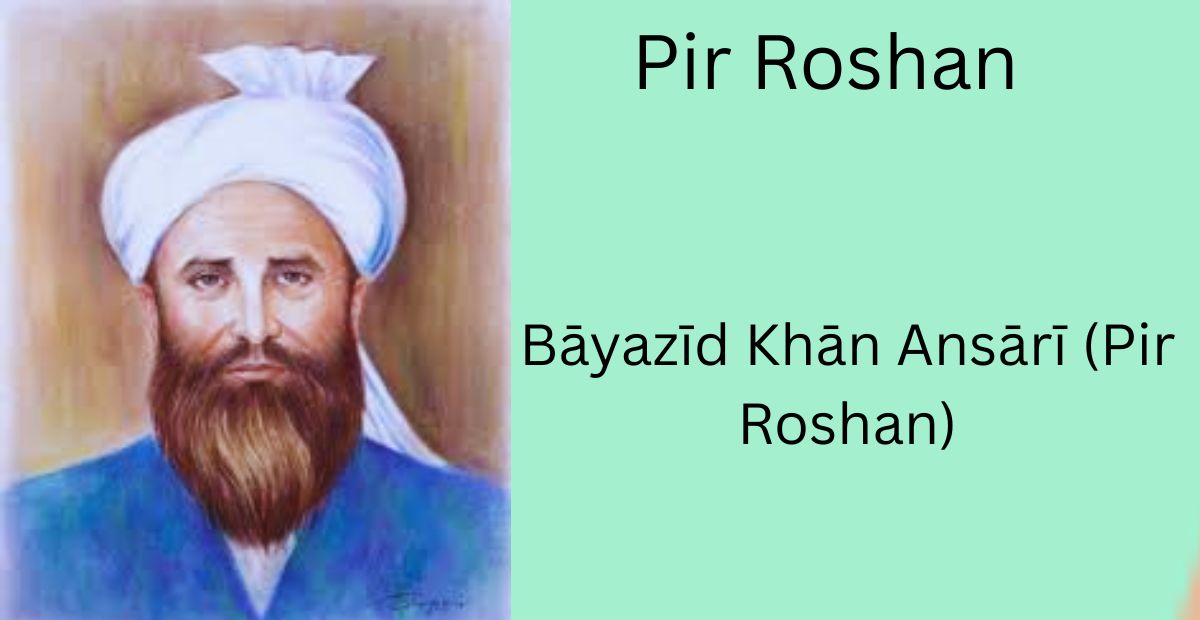Native name: بایزید خان انصاري
Also known as: Pīr Rōshān, Pīr Rōkhān
Born: c. 1525, near Jalandhar, Punjab, India
Died: 1585, near Topi, present-day Pakistan
Nationality: Pashtun (Ormur tribe)
Languages: Ormuri (native), Pashto, Persian, Arabic, Urdu
Known for: Founding the Roshani Movement, writing Khayr al-Bayān, creating a Pashto alphabet
Region of influence: Afghanistan and northwestern Pakistan
Early Life and Background
Bayazid Khan Ansari was born around 1525 near Jalandhar in present-day Indian Punjab. Though born in India, his family hailed from the Lohgar Valley near Kabul and belonged to the Ormur (also called Baraki) tribe. They later settled in Kaniguram, in present-day South Waziristan, Pakistan. His father, Abdullah, was a respected Islamic Qadi (judge) and trader. Bayazid grew up in a religiously prominent but also materially privileged family, which he would later challenge due to his strong-willed and reformist temperament.
Spiritual Career and the Roshani Movement
Bayazid began teaching at the age of 40, gaining followers among the Mohmand, Shinwari, Khalil, and Muhammadzai Pashtun tribes. His teachings fused Islamic mysticism (Sufism) with philosophical rationalism and sought reform in the tribal and religious customs of his time. He strongly opposed the Mughal Emperor Akbar’s syncretic religious policy, Din-i Ilahi, which he saw as an authoritarian spiritual experiment.
Pashto Literary Contributions
Pir Roshan was a pioneer of Pashto literature:
- He created a Pashto alphabet, expanding the Arabic script with 13 additional letters.
- He authored Khayr al-Bayān, one of the earliest known books of Pashto prose, which also included Persian, Arabic, and Urdu segments.
- His efforts contributed to a Pashtun cultural revival, often referred to as the “first Pashtun renaissance.”
Military Resistance Against the Mughals
Bayazid led a major armed resistance against Mughal expansion in the Afghan-Pashtun region. His movement united various Pashtun tribes under the Roshani banner, and they successfully challenged Mughal forces in multiple skirmishes. The Mughals derogatorily called him Pīr-e-Tārīk (“Dark Sufi Master”).
When he began gaining influence among the Yousafzai tribe, he faced opposition from Pir Baba (Sayyid Ali Tirmizi) and Akhund Darweza, Islamic scholars aligned with Akbar. Nevertheless, Pir Roshan’s forces caused one of the greatest military disasters of Akbar’s reign in 1586, when 8,000 Mughal troops, including the courtier Birbal, were killed near Karakar Pass.
However, shortly after, Pir Roshan himself was killed near Topi by Mughal forces in late 1585.
Legacy and Successors
After his death, Pir Roshan’s youngest son, Pir Jalala Khan, continued the resistance. Though initially pardoned by Akbar, Jalala later led a fresh wave of rebellion. The struggle was carried forward by subsequent leaders, including Ahdad Khan and Abdul Qadir.
The Roshani movement remained active for nearly a century after Bayazid’s death, with major centers of resistance in Waziristan, Tirah, Loya Paktia, and Nangarhar. Mughal emperors Jahangir and Shah Jahan attempted to suppress the movement through brutal military campaigns, including the massacre of 300 Daulatzai Orakzai in Tirah.
By the mid-17th century, a truce was achieved between Shah Jahan and Pir Roshan’s descendants, who later resettled in Jullundhar, establishing new settlements such as Basti Danishmandan and Basti Baba Khel.
Ideology and Assessment
Pir Roshan’s philosophy combined mysticism with social reform, advocating for:
- Equality, including among genders.
- Education and rational inquiry.
- Resistance to authoritarian religious and political systems.
His ideas were controversial and often labeled heretical by contemporary Islamic scholars. Orientalists of the 19th century sometimes misunderstood the Roshani movement, associating it with heterodox sects or even fringe mystic groups like the Order of Assassins. However, modern assessments, particularly from left-leaning and post-colonial scholars, regard him as a proto-reformer and anti-imperialist leader.
Modern Recognition and Studies
Pir Roshan remains a subject of academic interest:
- Soviet and Western scholars studied the Roshani movement during conflicts in Afghanistan as part of broader cultural research.
- Sergei Andreyev, under the Institute of Ismaili Studies and UN assignment, produced scholarly work on the Roshani movement.
In Pakistani and Afghan cultural memory, Pir Roshan is considered one of the early figures of Pashtun nationalism, resistance literature, and religious reform.
See Also
- Khushal Khattak – Pashto poet and anti-Mughal warrior
- Mullah Powindah – Waziristan-based anti-British militant leader
- Mirzali Khan (Faqir of Ipi) – 20th-century tribal leader and freedom fighter
References
(As listed in the original text, including works by Annemarie Schimmel, Jonathan L. Lee, James Wynbrandt, John F. Richards, and official colonial-era gazetteers.)
Would you like a downloadable version of this article in PDF or Word format?
